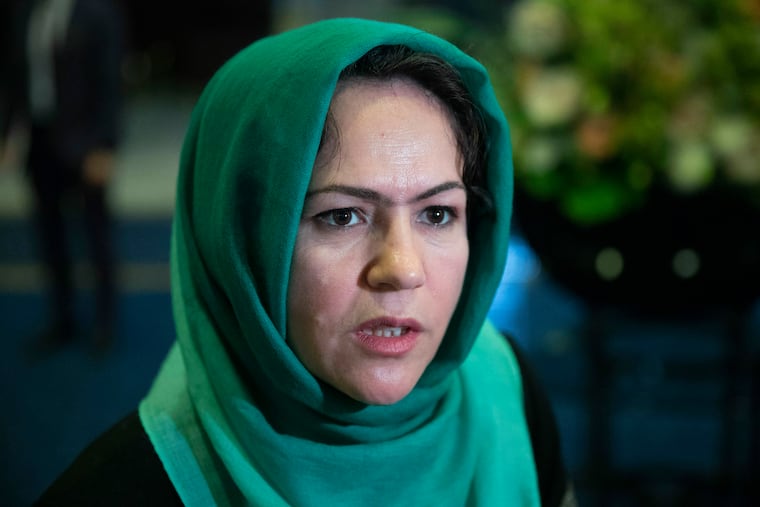There will be no peace in Afghanistan unless women’s rights are protected | Trudy Rubin
As White House considers whether to pull U.S. troops out by May 1, remember this: abandoning Afghan women will facilitate Taliban takeover of Afghanistan.

Fawzia Koofi’s arm still aches from the fractures sustained when an assassin’s bullets ripped through her car six months ago, as she drove home with one of her daughters in Kabul.
One of Afghanistan’s foremost female activists, a former deputy speaker of parliament, Koofi doesn’t know who tried to kill her, whether it was a faction of the Taliban or al-Qaeda. But now she is one of four women on the 21-person Afghan government team trying to negotiate a peace deal with the Taliban in Doha, the capital of the Gulf state of Qatar.
There has been almost no progress in the talks.
The intra-Afghan talks are based on a deal concluded between the Trump administration and the Taliban — without including the Afghan government. The deal was basically a cover story for withdrawing the last 2,500 U.S. troops from the country by May 1.
What the Taliban don’t want to talk about is a political agreement. They’ve made clear they want an Islamic state and they reject democratic elections — or a cease-fire. But, as President Joe Biden reconsiders the May 1 deadline, Koofi insists a quick U.S. exit would doom the peace process. And Afghan women would pay a terrible price.
» READ MORE: Burkas and betrayals: Is US selling out Afghan women to the Taliban | Trudy Rubin
“The United States should not pull its troops out before there is a political agreement,” Koofi told me by phone from Doha. “If they do, that would lead to civil war,” meaning an all-out battle among the Taliban, Afghan government forces, and Afghan warlords who would field their own militias.
In such a case, U.S. intelligence agencies have told the Biden administration, the Taliban will take over within two to three years, meaning al-Qaeda and ISIS can flourish again.
Why do 2,500 U.S. troops (and several thousand NATO troops who will leave when the Americans do) make such a difference, since the Afghans do almost all the fighting on the ground? A prime reason is that the United States never let the Afghans develop an air force; U.S. airpower (and intelligence-sharing) is essential to prevent a Taliban military victory before any political accord.
Moreover, the gains Afghans have made – especially for women and young people – would be lost under Taliban rule.
Fawzia Koofi’s life story is indicative of how much has changed in 20 years.
Born in the remote Afghan province of Badakhshan, the 19th of her father’s 23 children, she was put outside to die because she was female, but was rescued by her strong, illiterate mother. The only girl in her family to get an education, she was elected to parliament after the Taliban were overthrown.
I visited her and her two daughters at her Kabul home in 2011; one of those young women will return to Montclair State University in New Jersey this year for graduation, while the other attends college in Kabul.
Koofi is a role model for many thousands of young female graduates and schoolgirls. But it is too easy for me to recall a visit to Kabul under the Taliban in 1999, when 10-year-olds had to sneak through alleys to underground girls’ schools, and educated women were confined to their homes.
There are small signs of change from the Taliban in Doha. “For 20 years they wouldn’t talk to women, and initially some [of the negotiators] were hesitant to look at me,” Koofi says. “Now they say my name and engage in conversation.”
But the negotiators still insist women’s rights can only be viewed according to their ultraconservative interpretation of Islam. Koofi rightly believes that “women’s rights are a prerequisite of the process. They are interconnected with freedom of speech, political liberty, and the future of democracy.”
If U.S. troops leave now, she says, the Taliban are sure they will win, whether politically or militarily. I believe she is correct.
In an effort to speed up peace talks on a political settlement, Secretary of State Antony Blinken has unveiled a Hail Mary negotiating proposal that calls for Russia, China, Pakistan, Iran, and India to push for an accord. All have some interest in a stable Afghanistan. Blinken also called for a special round of peace talks in Turkey to seek a cease-fire and a transitional Afghan government in which the Taliban take part.
The concept is a good one, in theory. Unless Afghanistan’s key neighbors such as Pakistan and India concur on the country’s future, there can be no peace.
But no deal will happen quickly, especially since the Taliban will balk. And Koofi’s point is essential: There will be no political agreement if U.S. troops are withdrawn before it is inked.
Any U.S. withdrawal should be negotiated with the Afghan government, not the Taliban, and done separately from peace talks. (Contrary to pundits’ beliefs, Americans are not consumed with a quick withdrawal, according to a recent Pew poll.)
» READ MORE: Rights of Afghan women must be considered in any talks with Taliban | Trudy Rubin
Meantime, Koofi worries every time she gets a text from one of her daughters, since assassinations of female and male activists are occurring daily. But she and her daughters will not leave Afghanistan. She says: “For now my mission is to stay and fight for peace.”